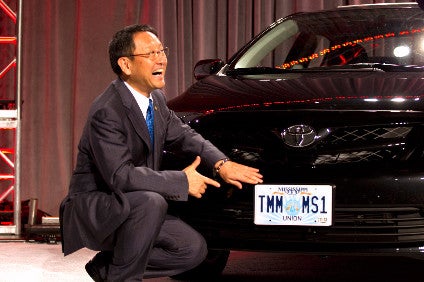
Despite selling almost 300,000 fewer vehicles worldwide, Toyota Motor Corporation (TMC) boosted revenue and profit in fiscal year 2015/16 ended 31 March, 2016. But it said annual net income would probably decline in this current fiscal year – for the first time in five years – because currency swings that had resulted in record profits now posed problems.
Vehicle sales fell 290,536 units in fiscal 2015/2016 to 8,681,328 year on year but revenues rose 4.3% to JPY28.4031 trillion. Operating income increased from JPY2.7505 trillion to 2.8539 trillion while net income increased from JPY2.1733 trillion to JPY2.3126 trillion yen.

Discover B2B Marketing That Performs
Combine business intelligence and editorial excellence to reach engaged professionals across 36 leading media platforms.
TMC said cost reductions of JPY390bn and currency fluctuations of JPY160bn were the main reasons for the JPY103.4bn increase in operating profit.
TMC executive vice president Takahiko Ijichi said: “Operating income increased by JPY103.4bn compared to the previous fiscal year. The positive factors such as cost reduction efforts and favourable foreign exchange rates more than offset the negative factors such as decreased vehicle sales and increased expenses, particularly labour costs and R&D expenses.”
In Japan, vehicle sales fell 94,601 unit to 2,059,093. Operating income, excluding the impact of valuation gains/losses from interest rate swaps, increased by JPY102.6bn yen to 1,676.7bn yen.
In North America, vehicle sales rose 124,056 to 2,839,229 units but operating income fell JPY 32.2bn to JPY505.6bn.
In Europe, vehicle sales fell 14,626 to 844,412 units but pperating incomerose JPY0.3bn to 75.7bn.
In Asia, vehicle sales totaled 1,344,836 units, a decrease of 144,086 units. Operating income increased JPY21.4bn to JPY455bn.
In other regions (including Central and South America, Oceania, Africa and the Middle East), vehicle sales fell 161,279 to 1,593,758 units and operating income fell JPY6.0bn to JPY103.4bn.
Financial services operating income fell JPY22.6bn to 339.2bn including a gain of JPY20.1bn in valuation gains/losses from interest rate swaps. Excluding those, operating income fell JPY2.8bn to JPY319bn.
For this fiscal year ending 31 March, 2017, TMC estimated vehicles sales of 8.9m, revenue of JPY26.5 trillion, operating income of JPY1.70 trillion and net income of JPY1.50 trillion based on an exchange rate of JPY105 to the US dollar and JPY120 to the euro.
That means net income may drop 35%. The forecast trailed the JPY2.19 trillion average of 23 analysts’ estimates compiled by Bloomberg. The automaker also expects foreign exchange rate changes to reduce operating profit by about JPY935bn.
Bloomberg noted TMC president Akio Toyoda has presided over three straight years of record annual profit, as a weakening yen boosted earnings from Japan-exported Corolla compacts and Lexus RX SUVs sold overseas. As the currency has strengthened more than 10% versus the dollar this year and US demand growth has stalled, the automaker is now racing to recover from production disruptions to keep ahead of Volkswagen by worldwide sales.
“We have benefited from an exchange rate tailwind that has helped raise our earnings above the level of our true capabilities,” Toyoda said in a statement cited by Bloomberg. “Although this has enabled us to take on new challenges, that set of circumstances is likely to change for the worse this year.”
“This forecast does not include the effects of suspension of operations on vehicle assembly lines in Japan resulting from the Kumamoto Earthquake that struck Japan’s island of Kyushu last month,” the automaker said in a statement.
Bloomberg noted Toyota has revived domestic assembly lines to make up for lost production of about 80,000 vehicles after Japan’s most devastating earthquakes since March 2011. Japanese plants that accounted for about 40% of the cars and trucks the company produced last fiscal year also shut for one week in February, due to a steel factory fire.
Recovering some of that output will be crucial to Toyota extending its reign as the world’s top-selling automaker to a fifth-straight year. The company fell behind Volkswagen during the first three months of 2016, with deliveries dropping 2.3% to 2.46m units. Despite an emissions scandal that’s escalated to the worst crisis in VW’s history, its deliveries rose 0.8% to 2.5m.
Bloomberg said challenges were already evident before the latest disruptions to Toyota’s production in Japan. Toyoda closed negotiations with the company’s labour union in March by saying business circumstances had changed, citing currency swings and stricter environmental regulations in emerging markets. Toyota raised base monthly wages by just JPY1,500 for this fiscal year, half the increase workers had requested.
The automaker is scheduled to build car factories in Mexico and China before the end of the decade, ending a suspension from adding new assembly plants since 2013, Bloomberg added. In the meantime, the company has developed an in-house global architecture system it sees cutting costs for new plants by 40% and product development by 20%.
The board will pay JPY110 per share as the year-end dividend on common shares taking the full annual dividend to JPY210. The board has also decided to buy back up to JPY500bn or 100m shares of the company’s common stock.






